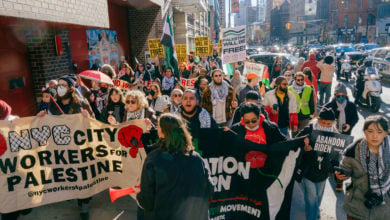After a five-day hunger strike with thousands of supporters who joined him, President Evo Morales forced the right wing in Bolivia’s senate to back down and approve a law establishing norms for the national elections of Dec. 6, 2009.
The Transitory Election Law would give Bolivians who live abroad the right to vote in the election and guarantee more parliamentary representation in the form of seven more seats in the lower house of parliament for Indigenous-populated districts in the eastern part of the country.

Bolivian president, Evo Morales,
signs new election law that
guarantees the Indigenous
majority more representation
in parliament
Bolivia is 60 percent Indigenous. The three main groups are Quechua, Aymara and Guaraní, along with 33 less numerous ethnic peoples. Brutally oppressed by the racist dominant class, the Indigenous were denied the right to vote until 1952, when a revolutionary struggle swept Bolivia.
Morales is the first Indigenous president of Bolivia since the Spanish conquest 470 years ago. His 2005 presidential victory has helped vindicate the oppressed masses, who are making historic social and economic gains.
His stance against the racist and right-wing oligarchy, which has tried to split off the eastern half of Bolivia, has earned him the support of the poorest of society.
Morales has nationalized Bolivia’s immense natural gas reserves. He has also led the fight for a new constitution as well as economic improvements like pension increases for seniors.
Morales’s popularity with the workers and peasants virtually assures him a presidential victory in December. But his government is embattled by the oligarchy, which controls most of the gas, mineral and land reserves of the eastern “Media Luna,” or “half moon.”
Like the revolutionary process in Venezuela, several referenda promoted by Morales’s Movimiento Al Socialismo (Movement Toward Socialism) party have resulted in popular majority support for Morales’s economic and social reforms.
This time, the right-wing majority in the senate refused to adopt the Transitory Election Law, which was required by the new constitution. The constitution was ratified Jan. 25.
In a victory speech to thousands of people as he ended his hunger strike and signed the new law, Morales said, “On Jan. 25, the Bolivian people gave a mandate to approve the election law in 60 days.”
“When the senate refused,” he continued amid cheers, “the president of Bolivia, together with his cabinet, and with the social movements like the Bolivian Workers Confederation, obligated the senate to respect the people’s will by our hunger strike.”
Not all the law was ratified, but Morales indicated it is a start and that with a strong parliamentary and presidential victory they will be able to gain a bigger foothold for the people.
During Morales’s hunger strike, Cuban leader Fidel Castro wrote several “reflexions.” Castro encouraged Morales and described for the world the heroic struggle that Morales had undertaken.
Castro wrote on April 11: “For the first time in the history of Bolivia, Evo has built a significant hard currency reserve which now allows him to face up to the grave international financial crisis; in less than three years he has eradicated illiteracy in Spanish, Aymara and Quechua; he has made it possible for the entire poor population to enjoy a safe minimum income; he is recovering the energy sources and conquering for Bolivia the admiration of the world.”
He then mentioned Cuba’s solidarity contributions to the people of Bolivia, including literacy teachers, the 5,000 Bolivian youth who are studying in Cuba to become medical doctors, and the 20,000 lives that have been saved by Cuba’s doctors in Bolivia.
Morales will now participate in the much-anticipated ALBA (Bolivarian Alternative for the Americas) conference in Venezuela on April 17. Then he will attend the Summit of the Americas April 18 and 19.





